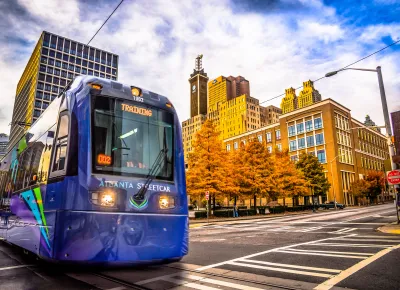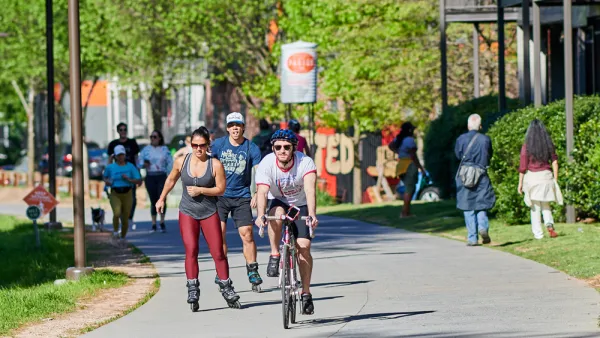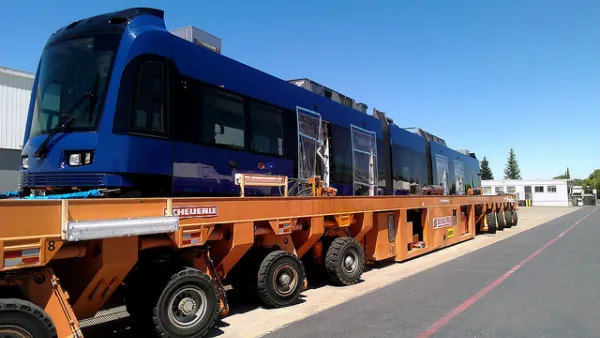The commissioner of the Georgia Department of Transportation warned Atlanta Mayor Kasim Reed and MARTA CEO Keith Parker that unless corrective actions are not taken in many areas, e.g., maintenance, safety, he will shut down streetcar service.

"In a letter to Mayor Kasim Reed and Metropolitan Atlanta Rapid Transit Authority (MARTA) CEO Keith Parker on [May 23], the Georgia Department of Transportation gave the city until June 14 to submit plans to address 60 outstanding problems outlined in the reports," writes David Wickert for The Atlanta Journal-Constitution. "If those plans are not sufficient, GDOT said, it will order the streetcar to shut down immediately."
The city and MARTA share responsibility for the $98 million system that runs in downtown Atlanta. State and federal law requires GDOT to oversee the safety and security of rail operations like the streetcar, GDOT Commissioner Russell McMurry said.
McMurry wrote that since the service started in December 2014, streetcar officials have failed to “provide timely, substantive and compliant responses to deficiencies identified by the department and (Federal Transportation Authority).”
The problems with the streetcar include poor maintenance procedures, inadequate staffing and a failure to properly investigate accidents.
Not all news was bad. In an optimistic note, McMurry informed The Atlanta Journal-Constitution that "the department expects the problems will be resolved."
But how did the problem gets to this point? Does responsibility lie with MARTA?
Last year, the Federal Transit Administration expressed concerns about the safety and operation of the streetcar. Among other things, it found defects in the streetcar’s overhead electrical system, poor operating procedures, significant management and staff vacancies and failure to comply with state accident reporting requirements.
“Clearly, MARTA’s overall ‘active management’ role, as the entity ‘directly responsible for the day-to-day management of the Atlanta Streetcar,’ has not been sufficient to date,” FTA Region IV Administrator Yvette Taylor wrote on Sep. 3, 2015, reported The Atlanta Journal-Constitution's Katie Leslie last September.
Leslie wrote in January that according to a GDOT report, "the city and MARTA lack clarity when it comes to their roles in running the streetcar." She went on to list problems the ongoing problems that ultimately led to the May 23 letter.
"State Sen. Vincent Fort, D-Atlanta, traced the problems to the city’s involvement in running the streetcar," adds Wickert. "He wants MARTA to operate the system and earlier this year introduced an unsuccessful bill that would have put the system under its control."
Ridership plummets
Meeting GDOT's reporting requirements is not the streetcar's only problem, writes Wickert.
After offering free fares for a year, the streetcar started charging $1 in January. Ridership plummeted. About 91,000 people rode the street in the first three months of this year – 48 percent less than the same period in 2015.
An April post indicated that Atlanta has "big plans to extend the line." Before expanding to 50 miles, as the city hopes, the first priority must be to address urgent operational concerns that revealed themselves in the first phase, the 2.7-mile downtown route.
FULL STORY: State threatens to close Atlanta streetcar

Analysis: Cybertruck Fatality Rate Far Exceeds That of Ford Pinto
The Tesla Cybertruck was recalled seven times last year.

National Parks Layoffs Will Cause Communities to Lose Billions
Thousands of essential park workers were laid off this week, just before the busy spring break season.

Retro-silient?: America’s First “Eco-burb,” The Woodlands Turns 50
A master-planned community north of Houston offers lessons on green infrastructure and resilient design, but falls short of its founder’s lofty affordability and walkability goals.

Test News Post 1
This is a summary

Analysis: Cybertruck Fatality Rate Far Exceeds That of Ford Pinto
The Tesla Cybertruck was recalled seven times last year.

Test News Headline 46
Test for the image on the front page.
Urban Design for Planners 1: Software Tools
This six-course series explores essential urban design concepts using open source software and equips planners with the tools they need to participate fully in the urban design process.
Planning for Universal Design
Learn the tools for implementing Universal Design in planning regulations.
EMC Planning Group, Inc.
Planetizen
Planetizen
Mpact (formerly Rail~Volution)
Great Falls Development Authority, Inc.
HUDs Office of Policy Development and Research
NYU Wagner Graduate School of Public Service



























